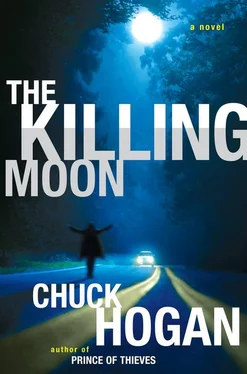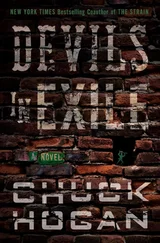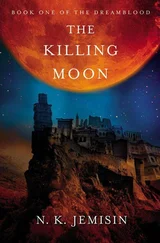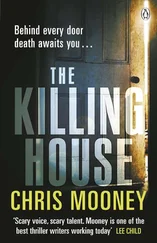The mind takes unexpecteds such as these and tries to shape them into something understandable, tries to assign them meaning.
The mental image Maddox assigned to this noise was that of Dillon Sinclair stepping onto his back deck.
So powerful was the force of this image — the black wig and clothes, the eyebrowless eyes — that Maddox moved to his closet, getting down his holster from the top shelf. He undid the trigger lock in what seemed to take an inordinate amount of time, then moved to the sliding glass door off the serving area.
He stepped out into the wet heat, his revolver at his side. No one on the deck, the backyard empty. He scanned the trees around the yard and listened for movement. Then he saw the twisted black lump on the deck.
Closer, he made out the velvet fringe of wings. A dead crow, eyes and beak still open, its neck broken.
Maddox looked at the near trees, his mind still jumping with implications — Who threw a dead bird onto my deck? — until he realized that the thump, so solid and quick, had been this bird striking the window. The bump that followed was its dead body falling to the wood.
You want omens? he thought. We got omens. A town full of them. Deer running antler-first into your car. Crows flying full speed at your house. Nature dispatching its assassins.
He carried the revolver back inside and returned with a shovel from the garage, scooping up the dead crow and walking it to the deepest part of the yard, pitching it into the woods near the spot from where Sinclair had snapped the photograph of his house. Maddox stood there a few moments, the weight of the shovel in his hands, looking into the trees. He realized that the crow indeed had flown out of the woods to tell him something. Something important.
It was time to let Sinclair go. To give up needing to believe in his innocence. Maddox’s fear of the thump reminded him that Dill was as capable of murder as any man. Whatever his father had put him through, whatever had happened to him in that house at the other end of the street: it happened to Sinclair, not to Maddox. Dill had made his own choices since then. The rest was up to Hess.
Maddox went back inside. He picked up the phone and called Tracy. “Let’s talk,” he said, inviting her for dinner. He could sense, in the way she so casually affected to resist him, the hurt infecting her like a cold. But she did agree to come over that evening, then hung up without saying another word.
Outside, the air was stifling, the humidity at its breaking point, and yet Maddox felt good suddenly. He felt a change in the wind.
On his way to Pinty’s house, he came upon Ripsbaugh patching a pothole and pulled over. Branches waved overhead, leaves flippering behind the sweat-drenched man. “About as bad as it gets, huh?” said Maddox through his rolled-down passenger window.
Ripsbaugh bent over to see inside, shovel in hand. “You can taste the lightning coming.”
“Hey, about yesterday at the cemetery. My grand theories? Just forget about all that.”
“Yeah? How so?”
“It is what it is. I’m not sure why I had to try and make more of it.”
Ripsbaugh looked almost suspicious. Maddox worried that he had awakened a conspiracy theory. “Just forget it altogether.”
“I have.”
Maddox thought about saying something to Ripsbaugh about Val’s visit yesterday. But enough. Val had made her choices too, whether she could admit it or not. Maddox drove away, leaving Ripsbaugh leaning on the long handle of his shovel under the darkening sky.
Inside Pinty’s house, a stillness hung like the moisture. On a desk inside the upstairs bedroom that used to be Pinty’s home office, an oval-framed photograph showed a younger, bare-armed Pinty standing with his hand on the shoulder of his towheaded, ten-year-old son, Gregory.
Maddox sat down in Pinty’s chair, holding the photograph. Every community, it seemed to him, lost its “innocence” on a fairly regular basis, usually once per generation. Each new age required its own poignant milestone, its pedigreed moment of loss, marking the passage of child into adult. A dividing line between the way things used to be and the way things are now. Maddox’s father’s murder thirty years before at the hands of Jack Metters had been such an event. But Black Falls never recaptured its putative innocence. What followed instead was one loss after another, a decline growing more precipitous with each successive year. All tracing back to that one fatal moment in time.
Maybe the town’s regenerative powers were gone for good. Maddox thought of Metters’s gun blasting its way through his peacoat pocket, the rounds cutting hot into his father’s chest, thudding into Pinty’s hips and waist — and their trajectory continuing through the years, right into today.
Rosalie was jittery, what with the wind blowing through the barn and the early darkness and thunder heralding the coming storm. Tracy had come out to the old cowshed to sit with her, to console the pregnant llama with her presence as they prepared to weather the cloudburst together. She leaned over the stable door to touch noses with Rosalie, as the females liked to do, Tracy smelling the sweet hay and the dung of Rosalie’s stall and the sweaty essence of her coat, reaching up gently to stroke her long, proud neck.
What did Donny want to meet for? What could they possibly have to talk about? Hey, it was great, it was fun, let’s keep in touch?
Part of her personal theory of reverse therapy — where she tore herself down instead of building herself up, the idea being to get so low that there could only be betterment ahead — involved making short, punchy “No More” lists:
No more lazy nights together.
No more rum and Diet Cokes (negative taste association).
No more curling up with him on the sofa.
No more deep, half-remembered conversations while watching bad TV.
No more allowing herself to get silly in front of him, or anyone — ever.
No more falling asleep in Donny’s bed.
No more of his lips on her back and shoulders.
No more Donny.
The warm body she had once clung to like a life raft: he had been her dream of a man. No background. No past history, no baggage. No family to impress or avoid. He came perfectly shaped, and perfectly empty, to be filled up any way she liked.
Now he had a past. Now he had a history and regrets and shortcomings. Now he was real.
This was the only way it could end. His departure had been predestined, like a merman needing to return to the sea.
But really, she shouldn’t be sullen. She had been warned, hadn’t she? And repeatedly — every goddamn step of the way — something he would no doubt remind her of yet again tonight. It was temporary, it was short-term, it was going to end. Her bad for falling in love. Wish him well, and hope he remembers her fondly as he goes off on his merry journey back into the world.
She was sick of being the gracious loser. Sick of being kept back in life and expected to accept it as her lot. The farm and her mother and this land. Who else was she ever going to meet in Black Falls? Who else was going to blow into town except those already banished from the world? Who else but lepers visited this colony?
If only she were hard enough to stand him up tonight. To be as cruelly dispassionate. But she didn’t even bother with retributive fantasies because, pathetic little hopeful bird that she was, she would go, she would listen, she would hope, she would let him feel better about himself, and then she would hug him good-bye as he ground his heel into her chest.
Rosalie nodded like she understood. Tracy admired the llamas; their fierce protective instincts when guarding herds of sheep, goats, cows, or horses; their tireless work ethic; the aggression they displayed when sensing a threat. They were popular guard animals because they were fearless about hurtling their three-hundred-pound bodies full speed at any predator, be it dog or coyote or wolf or even small bear, wailing a high-pitched alarm. What they lacked in grace and refinement, they more than made up for in pride and attitude and strength. Even a yearlong pregnancy never got Rosalie down. She didn’t need a male companion to make her feel whole, or special, or loved.
Читать дальше












